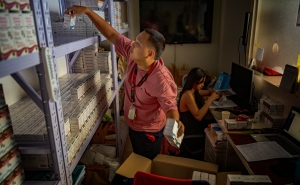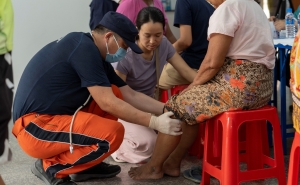Inaugural Global Health Security Index Finds Significant Gaps in Preparedness for Epidemics and Pandemics
Even high-income countries are found lacking and score only in the average range of preparedness
A new Global Health Security Index, the first comprehensive assessment and benchmarking of health security and related capabilities across 195 countries, suggests that not a single country in the world is fully prepared to handle an epidemic or pandemic. The GHS Index is a joint project of the Johns Hopkins Center for Health Security and the Nuclear Threat Initiative (NTI), with research by The Economist Intelligence Unit (EIU). The Center for Health Security is a part of the Johns Hopkins Bloomberg School of Public Health.
The inaugural GHS Index finds severe weaknesses in countries’ abilities to prevent, detect, and respond to significant disease outbreaks. The average overall 2019 GHS Index score is slightly over 40 out of a possible score of 100. Among the 60 highest-income countries assessed, the average score is 51.9.
Jennifer Nuzzo, associate professor at the Bloomberg School and senior scholar at the Center for Health Security, said the GHS Index, developed with guidance from an International Panel of Experts from 13 countries, can be used by health ministers and international organizations, philanthropists and funders, academics and researchers.
“The GHS Index finds that no country is fully prepared for naturally occurring, intentional, or accidental infectious disease outbreaks,” Nuzzo said. “Knowing that there is work to do, countries can use the index to identify gaps, build preparedness and best practices, and track progress over time.”
“Whether they be natural, accidental, or deliberate, infectious disease outbreaks can cause significant harm to health, peace, and prosperity if countries are not adequately prepared,” said Center for Health Security director Tom Inglesby. “It is important for national leaders to understand the risks that infectious diseases pose and commit to making improvements in preparedness for these events.”
The GHS Index assessed countries across six categories, 34 indicators, and 140 questions, using only open-source information and data from international organizations, including the World Health Organization, the World Organisation for Animal Health, the Food and Agriculture Organization of the United Nations (UN), and the World Bank.
Top findings
The Index found that:
- Fewer than 7 percent of countries score in the highest tier in the category assessing the prevention of the emergence or release of pathogens.
- Only 19 percent of countries receive top marks (scoring a 66.7 out of 100 or higher) in the category assessing early detection and reporting of epidemics of potential international concern.
- Fewer than 5 percent of countries score in the highest tier in rapid response to and mitigation of spread of an epidemic.
- With an average score of 26.4 out of 100, having a sufficient and robust health sector to treat the sick and protect health workers was the lowest-scoring category.
The GHS Index findings and recommendations for addressing significant gaps in global health security come amid an ongoing Ebola outbreak in the Democratic Republic of Congo and five years after the UN Security Council met in crisis over the Ebola epidemic in West Africa.
At a time when risks are magnified by a rapidly changing and interconnected world and rapid technology advances make it easier to create and engineer pathogens, knowing the risks is clearly not enough. Political will is needed to protect people from the consequence of epidemics, to take action to save lives, and to build a safer and more secure world.
Top recommendations
A core principle of the GHS Index is that health security is a collective responsibility. The GHS Index offers 33 recommendations for individual countries and for the international community. Recommendations include:
- The UN Secretary-General should call a heads-of-state-level summit by 2021 on biological threats, including a focus on financing and emergency response.
- National governments should commit to take action to address health security risks.
- Health security capacity in every country should be transparent and regularly measured, and results should be published at least once every two years.
- Leaders should improve coordination in insecure environments, especially linkages between security and public health authorities.
- New financing mechanisms should be established to fill preparedness gaps, such as a new multilateral global health security matching fund and expansion of World Bank International Development Association allocations to include preparedness.
- The UN Secretary-General should designate a permanent facilitator or unit for high-consequence biological events.
- Countries should test their health security capacities and publish after-action reviews, at least annually.
- Governments and donors should take into account countries’ political and security risk factors when supporting health security capacity development.
The GHS Index was developed over two and a half years. Key steps included an initial pilot project to test the framework; reviews by the International Panel of Experts that includes 21 experts from 13 countries; a yearlong data collection and validation process by 110 EIU researchers and reviews throughout the world; and opportunities for governments to validate data.
Visit www.ghsindex.org to explore the GHS Index data, download the full report and data model, view profiles for each country, use the score simulator, review the full methodology, and watch the GHS Index video.
The GHS Index was made possible through generous grants from the Open Philanthropy Project, the Bill & Melinda Gates Foundation, and the Robertson Foundation.
# # #
Media contacts: Jackie Fox at 443-510-0022 or jfox46@jhu.edu and Robin Scullin at 410-955-7619 or rsculli1@jhu.edu.
For more information on the novel coronavirus and COVID-19, visit our COVID-19 Expert Insights site.





